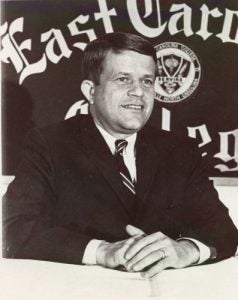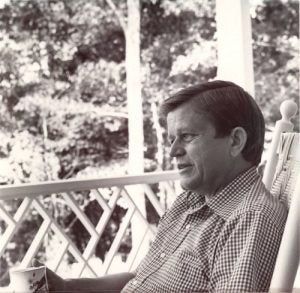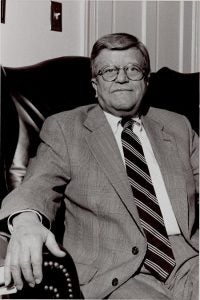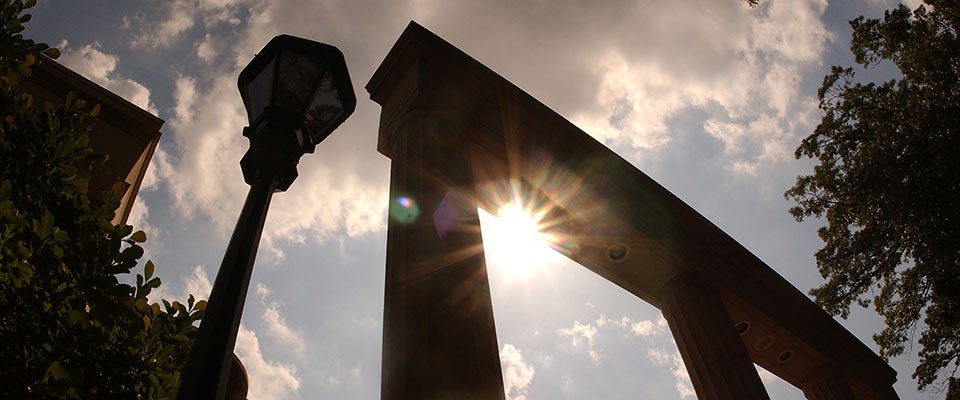HEARTFELT RECOGNITION
Morgan, ECU alumnus and former senator, dies at 90
Robert B. Morgan, an East Carolina alumnus and small-town lawyer who rose to the U.S. Senate, died Saturday at his home in Buies Creek. He was 90.
He was a former N.C. attorney general and a longtime figure in state politics. He also was a staunch supporter of his alma mater, serving as chair of the alumni association board, as trustee chairman for nine terms in the 1960s and helping lead the fight with Chancellor Leo Jenkins to establish a medical school at ECU.

Chairman of the East Carolina College Board of Trustees Robert Burren Morgan, sits at a table in front of an ECC banner in 1967. (Photos courtesy Joyner Library Digital Collection)
“Morgan’s contributions to East Carolina University were, then, every bit as important as those of Leo Jenkins, and some might argue even more so,” said John Tucker, a professor of history at ECU and university historian. “The achievements usually credited to Leo Jenkins, then president of East Carolina, would never have been possible without his ally in the N.C. State Senate, Sen. Robert Morgan.”
Morgan grew up in Lillington and in 1942 followed a sister, Ester, to East Carolina Teachers College, as it was called then. He was treasurer of his freshman class, but left school in 1944 to join the Navy. He then returned and graduated in 1947.
In 2007, Morgan spoke to a reporter about his days on campus. “There were a thousand girls, and there weren’t but 50 boys. ‘Course the boys were off to war, you know,” Morgan said. “When we’d walk down the campus, the girls would whistle at us.”
After graduating from East Carolina, he went to law school at Wake Forest University. He began his political career while still a student, becoming clerk of court in Harnett County.
In 1955, he was elected to the state Senate and rose to its highest office, president pro tem.

Former U.S. Senator Robert B. Morgan sits in a rocking chair on his porch in 1979.
Tucker credits Morgan, along with another senator, the elder Walter B. Jones of Farmville, and state Rep. W. A. “Red” Forbes of Winterville with winning legislative approval of a one-year med school program for East Carolina.
“He did this despite substantial opposition from the N. C. Board of Higher Education, then the governing body for higher education in North Carolina,” Tucker said. “Jenkins was behind this, but Morgan made it happen where it had to: in the state legislature. The fight would continue for years to expand the medical school, and throughout it Morgan was East Carolina’s voice in the state legislature.”
In 1966, Morgan introduced the bill to make East Carolina a university. Again, against substantial opposition, East Carolina prevailed in the General Assembly. Then-Gov. Dan Moore opposed this bill and the earlier medical school bill, but without the veto power, he couldn’t stop them.
“He was someone who really knew how to get things done in the legislature,” said Tom Eamon, associate professor of political science at ECU and author of “The Making of a Southern Democracy: North Carolina Politics from Kerr Scott to Pat McCrory.”
In 1968, Morgan ran for and won the job of state attorney general, championing consumer issues and standards for law enforcement training, and was re-elected four years later.
In 1974, he ran for the U.S. Senate seat previously held by Sen. Sam Ervin. He won and served on numerous committees including the Armed Services Committee, worked to pass federal anti-trust legislation and became an ally of President Jimmy Carter.
But that, and his support for a treaty turning control of the Panama Canal over to Panama, was used against him in his 1980 re-election campaign. In a race decided by about 10,000 votes out of nearly 1.8 million cast, Morgan lost to Republican John East, a political science professor from, ironically, ECU.

Morgan, class of 1947, is remembered by those who knew him as a “profoundly humble man” and one of ECU’s “heroes of the East.”
At ECU, the race, Eamon said, “put some people on the spot.” Morgan was one of the driving forces in the development of ECU, Eamon said, while East was a popular faculty member who had been active in Republican circles.
“It was hard-fought,” Eamon said, and a bit of a surprising outcome.
But that wasn’t the end of Morgan’s involvement in state politics or working to advance causes he believed in.
In 1985, he was appointed director of the State Bureau of Investigation.
Morgan returned to the practice of law in 1991, opening offices in Raleigh and Lillington with his two daughters. He continued to practice law into his 80s.
From 2000 to 2003, Morgan served as founding president of the North Carolina Center for Voter Education, a Raleigh-based nonprofit and nonpartisan organization that seeks to increase civic engagement in North Carolina. He had a life-long interest in issues related to persons with disabilities and also was an advocate for environmental causes.
“A profoundly humble man, Morgan never boasted of his accomplishments and typically credited others instead,” Tucker said. “He deserves our heartfelt recognition as one of ECU’s heroes of the East.”
ECU recognized his leadership and devotion by conferring upon him an honorary degree; presenting him with the Jarvis Medal, the university’s highest service award; naming him Outstanding Alumnus; and presenting him with its Alumni Service Award.
In addition to his first stint in the service, Morgan served in the Navy again during the Korean Conflict from 1952-1955. He remained in the Navy Reserve through 1971 and also served in the Air Force Reserve from 1971-1973.
Morgan was a lifelong Baptist and served on the board of deacons of Memorial Baptist Church in Buies Creek and as chair of the North Carolina Baptist Retirement Homes Foundation.
He is survived by his wife, Katie, three children and several grandchildren. A daughter, Alice Jean Morgan, died before him.
A memorial service will be held in the Butler Chapel at Campbell University in Buies Creek at 2 p.m. Thursday. The family will receive friends immediately following the service in the chapel gathering hall.
In lieu of flowers, contributions may be made to the ECU Foundation, Mailstop 301, 2200 S. Charles Blvd., Greenville, NC 27858-4353. Please write “J.Y. Joyner Library Robert Morgan Papers” in the memo line.
Below, Morgan received the university’s highest service award — the Thomas Jordan Jarvis Medal — in 2004.
